2015年中考英语二轮专题复习教案:专题14 简单句
文档属性
| 名称 | 2015年中考英语二轮专题复习教案:专题14 简单句 |
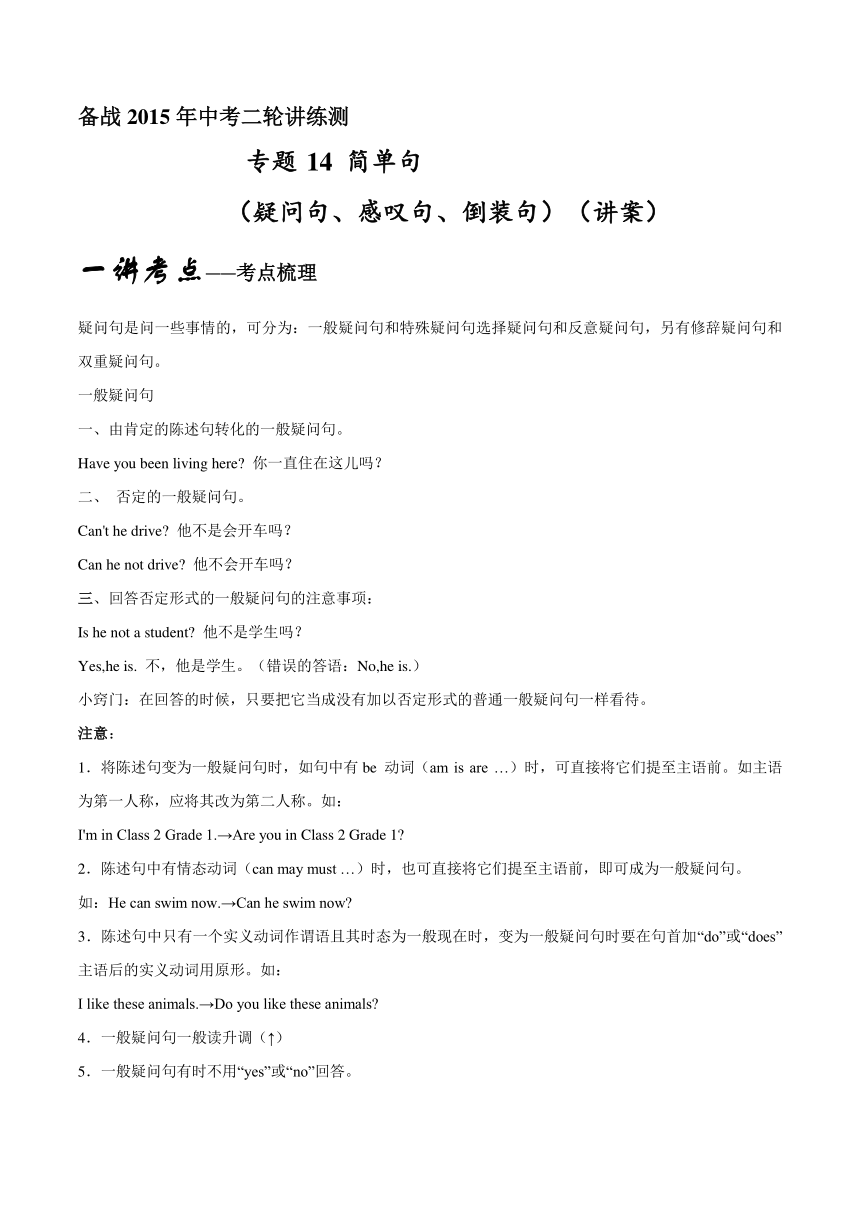
|
|
| 格式 | zip | ||
| 文件大小 | 20.6KB | ||
| 资源类型 | 教案 | ||
| 版本资源 | 仁爱科普版 | ||
| 科目 | 英语 | ||
| 更新时间 | 2015-06-05 00:00:00 | ||
图片预览

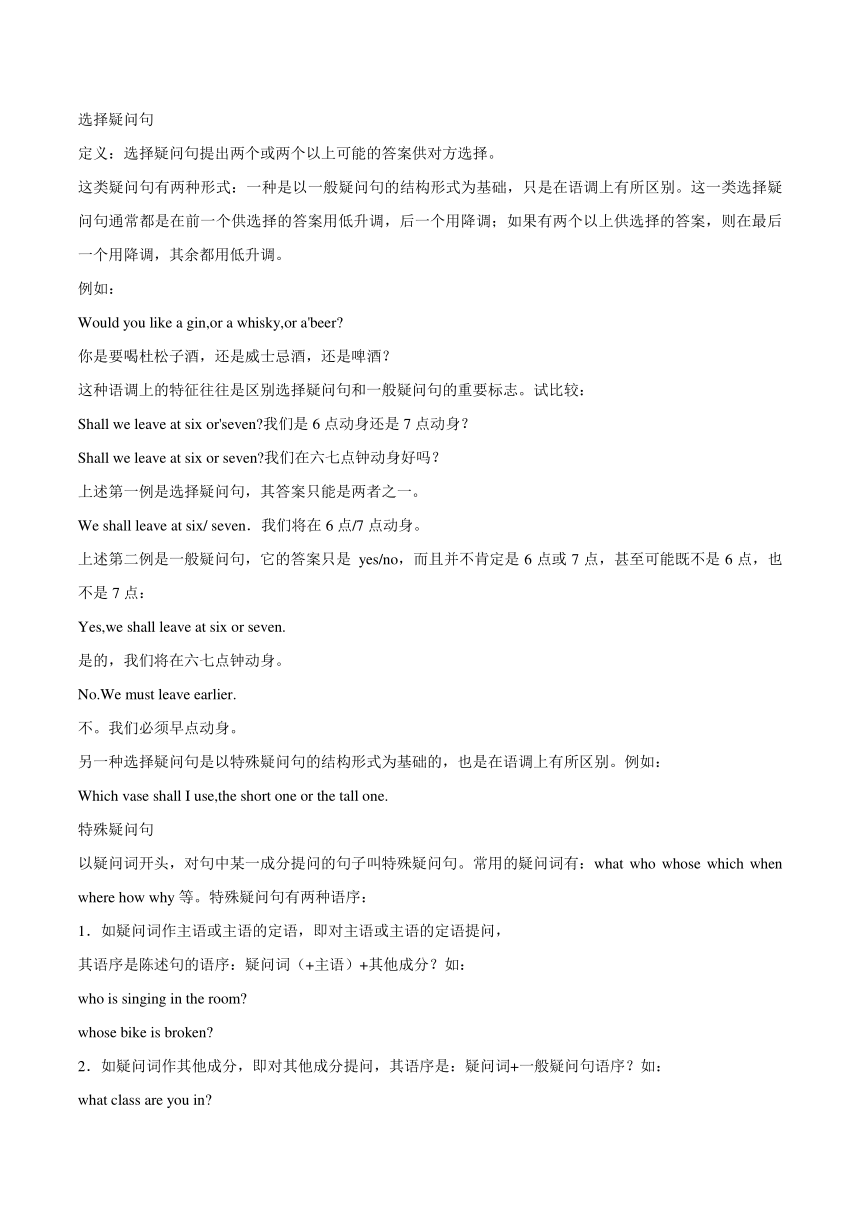
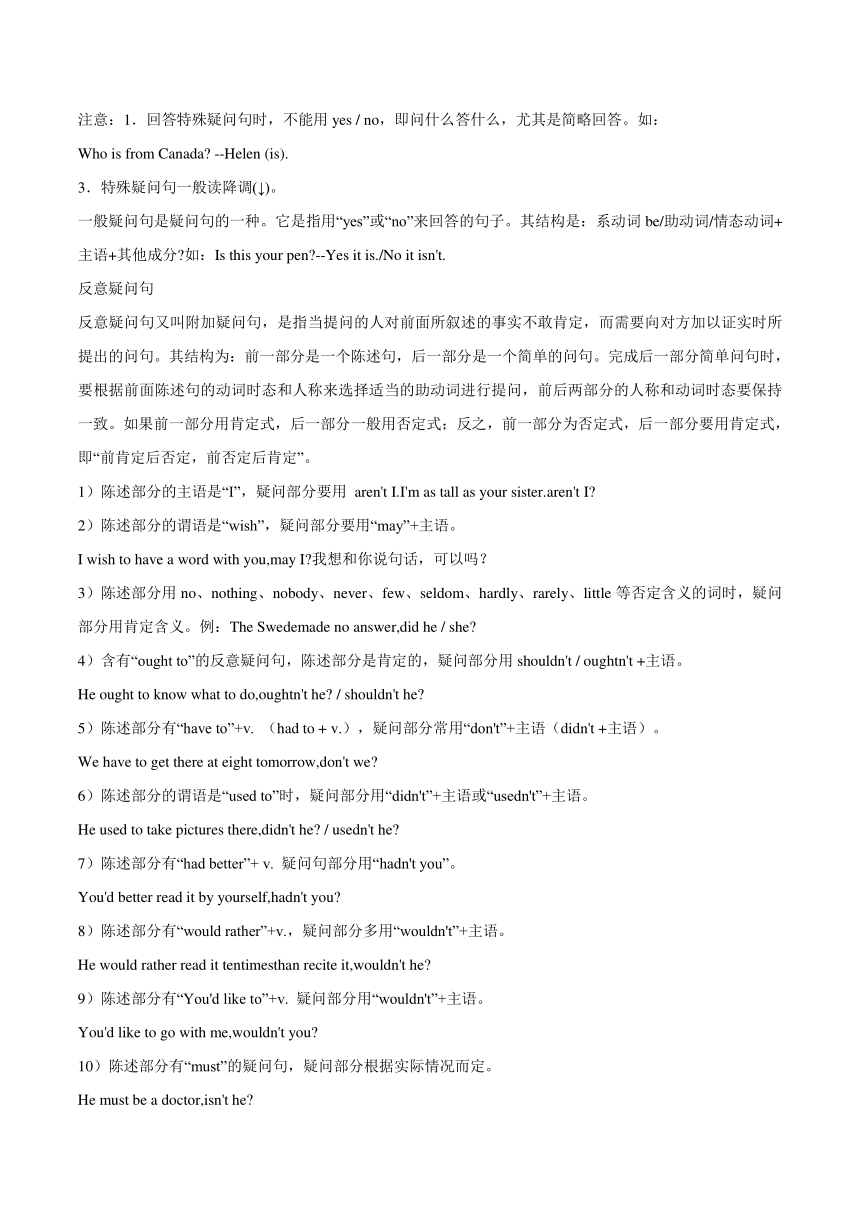
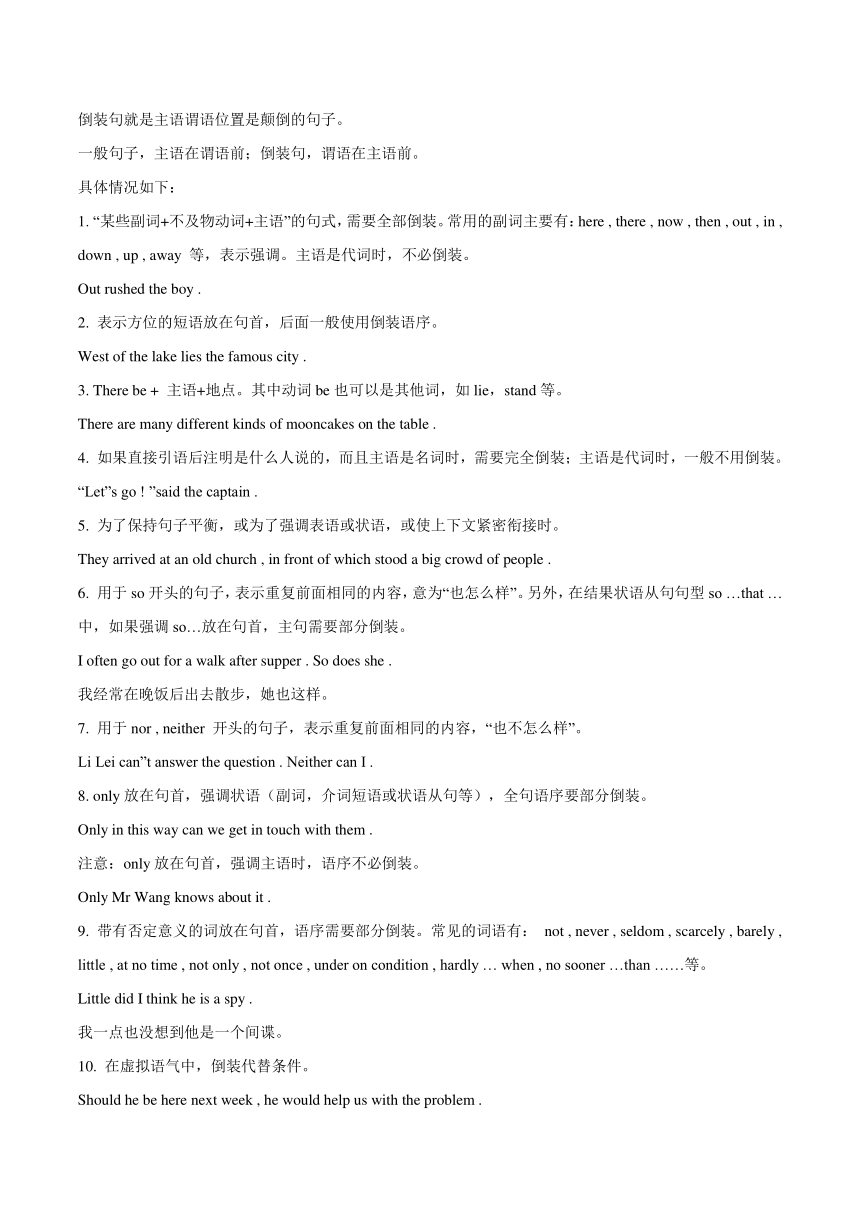
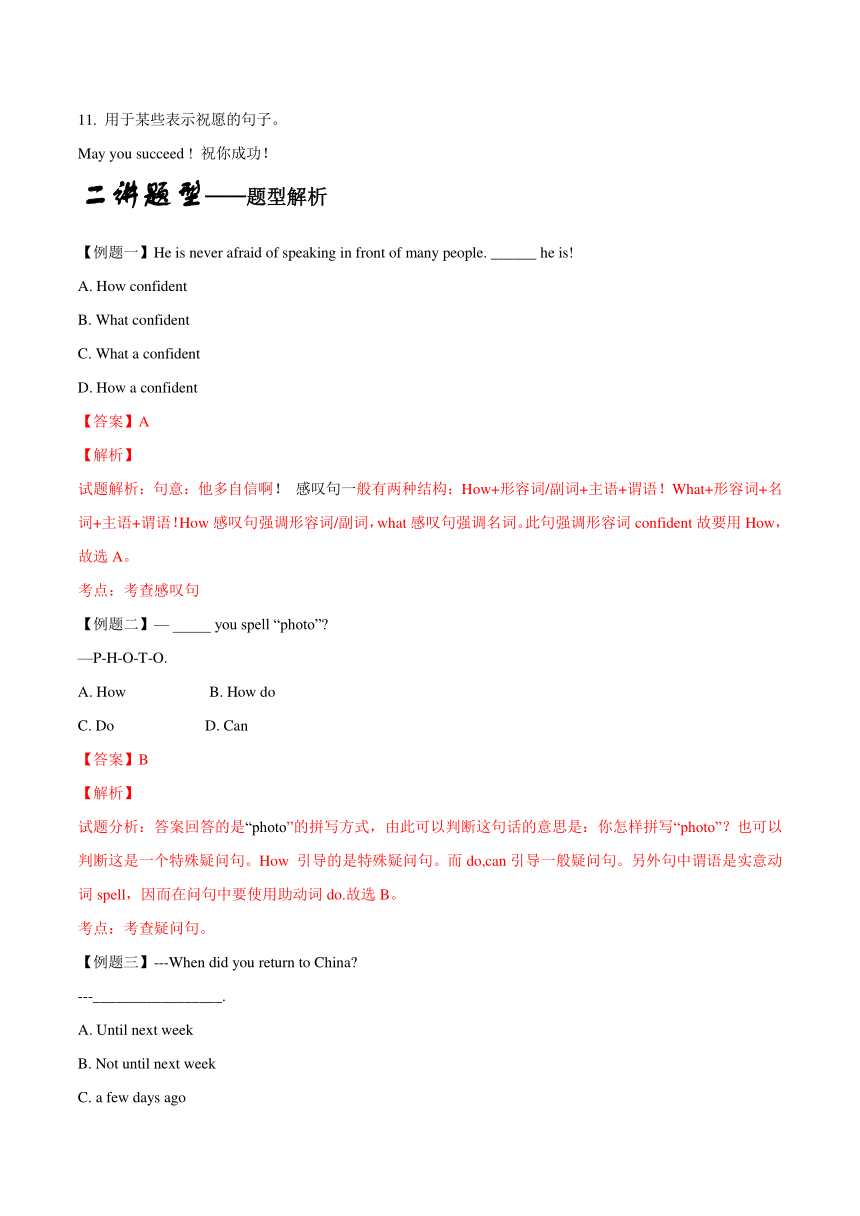
文档简介
备战2015年中考二轮讲练测
专题 14 简单句
(疑问句、感叹句、倒装句)(讲案)
一讲考点——考点梳理
疑问句是问一些事情的,可分为:一般疑问句和特殊疑问句选择疑问句和反意疑问句,另有修辞疑问句和双重疑问句。
一般疑问句
一、由肯定的陈述句转化的一般疑问句。
Have you been living here 你一直住在这儿吗?
二、 否定的一般疑问句。
Can't he drive 他不是会开车吗?
Can he not drive 他不会开车吗?
三、回答否定形式的一般疑问句的注意事项:
Is he not a student 他不是学生吗?
Yes,he is. 不,他是学生。(错误的答语:No,he is.)
小窍门:在回答的时候,只要把它当成没有加以否定形式的普通一般疑问句一样看待。
注意:
1.将陈述句变为一般疑问句时,如句中有b ( http: / / www.21cnjy.com )e 动词(am is are …)时,可直接将它们提至主语前。如主语为第一人称,应将其改为第二人称。如:
I'm in Class 2 Grade 1.→Are you in Class 2 Grade 1
2.陈述句中有情态动词(can may must …)时,也可直接将它们提至主语前,即可成为一般疑问句。
如:He can swim now.→Can he swim now
3.陈述句中只有一个实义动词作谓语且其时态为一般现在时,变为一般疑问句时要在句首加“do”或“does” 主语后的实义动词用原形。如:
I like these animals.→Do you like these animals
4.一般疑问句一般读升调(↑)
5.一般疑问句有时不用“yes”或“no”回答。
选择疑问句
定义:选择疑问句提出两个或两个以上可能的答案供对方选择。
这类疑问句有两种形式:一种是以一般疑问句的 ( http: / / www.21cnjy.com )结构形式为基础,只是在语调上有所区别。这一类选择疑问句通常都是在前一个供选择的答案用低升调,后一个用降调;如果有两个以上供选择的答案,则在最后一个用降调,其余都用低升调。
例如:
Would you like a gin,or a whisky,or a'beer
你是要喝杜松子酒,还是威士忌酒,还是啤酒?
这种语调上的特征往往是区别选择疑问句和一般疑问句的重要标志。试比较:
Shall we leave at six or'seven 我们是6点动身还是7点动身?
Shall we leave at six or seven 我们在六七点钟动身好吗?
上述第一例是选择疑问句,其答案只能是两者之一。
We shall leave at six/ seven.我们将在6点/7点动身。
上述第二例是一般疑问句,它的答案只是 yes/no,而且并不肯定是6点或7点,甚至可能既不是6点,也不是7点:
Yes,we shall leave at six or seven.
是的,我们将在六七点钟动身。
No.We must leave earlier.
不。我们必须早点动身。
另一种选择疑问句是以特殊疑问句的结构形式为基础的,也是在语调上有所区别。例如:
Which vase shall I use,the short one or the tall one.
特殊疑问句
以疑问词开头,对句中某一成分提问的句子叫特 ( http: / / www.21cnjy.com )殊疑问句。常用的疑问词有:what who whose which when where how why等。特殊疑问句有两种语序:
1.如疑问词作主语或主语的定语,即对主语或主语的定语提问,
其语序是陈述句的语序:疑问词(+主语)+其他成分?如:
who is singing in the room
whose bike is broken
2.如疑问词作其他成分,即对其他成分提问,其语序是:疑问词+一般疑问句语序?如:
what class are you in
注意:1.回答特殊疑问句时,不能用yes / no,即问什么答什么,尤其是简略回答。如:
Who is from Canada --Helen (is).
3.特殊疑问句一般读降调(↓)。
一般疑问句是疑问句的一种。 ( http: / / www.21cnjy.com )它是指用“yes”或“no”来回答的句子。其结构是:系动词be/助动词/情态动词+主语+其他成分 如:Is this your pen --Yes it is./No it isn't.
反意疑问句
反意疑问句又叫附加疑问句,是指当提问的 ( http: / / www.21cnjy.com )人对前面所叙述的事实不敢肯定,而需要向对方加以证实时所提出的问句。其结构为:前一部分是一个陈述句,后一部分是一个简单的问句。完成后一部分简单问句时,要根据前面陈述句的动词时态和人称来选择适当的助动词进行提问,前后两部分的人称和动词时态要保持一致。如果前一部分用肯定式,后一部分一般用否定式;反之,前一部分为否定式,后一部分要用肯定式,即“前肯定后否定,前否定后肯定”。
1)陈述部分的主语是“I”,疑问部分要用 aren't I.I'm as tall as your sister.aren't I
2)陈述部分的谓语是“wish”,疑问部分要用“may”+主语。
I wish to have a word with you,may I 我想和你说句话,可以吗?
3)陈述部分用no、nothing ( http: / / www.21cnjy.com )、nobody、never、few、seldom、hardly、rarely、little等否定含义的词时,疑问部分用肯定含义。例:The Swedemade no answer,did he / she
4)含有“ought to”的反意疑问句,陈述部分是肯定的,疑问部分用shouldn't / oughtn't +主语。
He ought to know what to do,oughtn't he / shouldn't he
5)陈述部分有“have to”+v. (had to + v.),疑问部分常用“don't”+主语(didn't +主语)。
We have to get there at eight tomorrow,don't we
6)陈述部分的谓语是“used to”时,疑问部分用“didn't”+主语或“usedn't”+主语。
He used to take pictures there,didn't he / usedn't he
7)陈述部分有“had better”+ v. 疑问句部分用“hadn't you”。
You'd better read it by yourself,hadn't you
8)陈述部分有“would rather”+v.,疑问部分多用“wouldn't”+主语。
He would rather read it tentimesthan recite it,wouldn't he
9)陈述部分有“You'd like to”+v. 疑问部分用“wouldn't”+主语。
You'd like to go with me,wouldn't you
10)陈述部分有“must”的疑问句,疑问部分根据实际情况而定。
He must be a doctor,isn't he
倒装句就是主语谓语位置是颠倒的句子。
一般句子,主语在谓语前;倒装句,谓语在主语前。
具体情况如下:
1. “某些副词+不及物动词+主语 ( http: / / www.21cnjy.com )”的句式,需要全部倒装。常用的副词主要有:here , there , now , then , out , in , down , up , away 等,表示强调。主语是代词时,不必倒装。
Out rushed the boy .
2. 表示方位的短语放在句首,后面一般使用倒装语序。
West of the lake lies the famous city .
3. There be + 主语+地点。其中动词be也可以是其他词,如lie,stand等。
There are many different kinds of mooncakes on the table .
4. 如果直接引语后注明是什么人说的,而且主语是名词时,需要完全倒装;主语是代词时,一般不用倒装。
“Let”s go ! ”said the captain .
5. 为了保持句子平衡,或为了强调表语或状语,或使上下文紧密衔接时。
They arrived at an old ( http: / / www.21cnjy.com ) church , in front of which stood a big crowd of people .
6. 用于so开头的句子, ( http: / / www.21cnjy.com )表示重复前面相同的内容,意为“也怎么样”。另外,在结果状语从句句型so …that …中,如果强调so…放在句首,主句需要部分倒装。
I often go out for a walk after supper . So does she .
我经常在晚饭后出去散步,她也这样。
7. 用于nor , neither 开头的句子,表示重复前面相同的内容,“也不怎么样”。
Li Lei can”t answer the question . Neither can I .
8. only放在句首,强调状语(副词,介词短语或状语从句等),全句语序要部分倒装。
Only in this way can we get in touch with them .
注意:only放在句首,强调主语时,语序不必倒装。
Only Mr Wang knows about it .
9. 带有否定意义的词放 ( http: / / www.21cnjy.com )在句首,语序需要部分倒装。常见的词语有: not , never , seldom , scarcely , barely , little , at no time , not only , not once , under on condition , hardly … when , no sooner …than ……等。
Little did I think he is a spy .
我一点也没想到他是一个间谍。
10. 在虚拟语气中,倒装代替条件。
Should he be here next week , he would help us with the problem .
11. 用于某些表示祝愿的句子。
May you succeed ! 祝你成功!
二讲题型——题型解析
【例题一】He is never af ( http: / / www.21cnjy.com )raid of speaking in front of many people. ______ he is!
A. How confident
B. What confident
C. What a confident
D. How a confident
【答案】A
【解析】
试题解析:句意:他多自信啊! 感叹句一 ( http: / / www.21cnjy.com )般有两种结构:How+形容词/副词+主语+谓语!What+形容词+名词+主语+谓语!How感叹句强调形容词/副词,what感叹句强调名词。此句强调形容词confident故要用How,故选A。
考点:考查感叹句
【例题二】— _____ you spell “photo”
—P-H-O-T-O.
A. How B. How do
C. Do D. Can
【答案】B
【解析】
试题分析:答案回答的是“photo ( http: / / www.21cnjy.com )”的拼写方式,由此可以判断这句话的意思是:你怎样拼写“photo”?也可以判断这是一个特殊疑问句。How 引导的是特殊疑问句。而do,can引导一般疑问句。另外句中谓语是实意动词spell,因而在问句中要使用助动词do.故选B。
考点:考查疑问句。
【例题三】---When did you return to China
---_________________.
A. Until next week
B. Not until next week
C. a few days ago
D. for a few weeks
【答案】C
【解析】
试题分析:句意:你什么时间回到的中国?根据句中的did可知,是一般过去时。故选C。
考点:考查时态
【例题四】----Have you ever seen the TV show Where Are We Going, DAD
-------_________. I think it’s quite moving and funny.
A. Yes, I have B. No, I haven’t
C. Yes, he has D. No, she hasn’t
【答案】A
【解析】
试题分析:句意:--你曾经看过电视节目《 ( http: / / www.21cnjy.com )爸爸,去哪儿?》吗?--是的,我看过。我认为它是十分的感人的并且有趣。联系答语,我认为它是十分的感人的并且有趣。说明曾经看过,因此用肯定回答。故选 A
考点:考查一般疑问句的答语。
【例题五】---- ____________
---- Sorry, we’ll go and play in the park.
A. Don’t drop litter here.
B. Would you mind not playing baseball here
C. You have to get up early.
D. Would you mind not smoking in public
【答案】B
【解析】
试题分析:句意:--你介意不在这玩棒球吗?--抱歉,我们将要去公园里玩。通过答语,play体现为去做运动,结合选项明确第二项正确。故选B
考点:考查交际用语的用法。
【例题六】 ------_______ free breakfasts _______in all schools in China
------No, not yet. Only in the rural areas.
Are; made B. Do; serve C. Are; served D. Do; make
【答案】C
【解析】
试题分析:句意:--早餐在中国所有学 ( http: / / www.21cnjy.com )校都是免费的吗?--不,还没有。仅在农村地区。分析:考查被动语态的用法,通过语境体现为一般现在时的被动语态。明确第三项正确。故选C
考点:考查被动语态的用法。
三讲方法——辨析特例
反意疑问句的特例
1)感叹句中,疑问部分用“be”+主语。
What colours,aren't they
2)陈述部分由“neither… no ( http: / / www.21cnjy.com )r”,“either… or ”连接的并列主语时,疑问部分根据其实际逻辑意义而定。Neither you nor I am engineer,are we
3)陈述部分主语是指示代词或不定代词everything,that,nothing,this,疑问部分主语用“it”。
Everything is ready,isn't it
4)陈述部分为主语从句或并列复合句,疑问部分有三种情况:
a. 并列复合句疑问部分,谓语动词根据邻近从句的谓语而定。
Mr. Smith had b ( http: / / www.21cnjy.com )een to Beijing for several times,he should have been in China now,shouldn't he
b. 带有定语从句,宾语从句的主从复合句,疑问部分谓语根据主句的谓语而定:
He is not the man who gave us a talk,is he
He said he wanted to visit Japan,didn't he
c. 上述部分主句谓语是think,b ( http: / / www.21cnjy.com )elieve,expect,suppose,imagine等引导的定语从句,疑问部分与宾语从句相对应构成反意疑问句。
I don't think he is bright,is he
We believe she can do it better,can't she
5)陈述部分主语是不定代词everybod ( http: / / www.21cnjy.com )y,anyone,somebody,nobody,no one等,疑问部分常用复数“they”,有时也用单数“he”。Everyone knows the answer,don't they (does he )
Nobody knows about it,do they (does he )
6)带情态动词“dare”或“need”的反意疑问句,疑问部分常用“need”(dare)+主语。
We need not do it again,need we
He dare not say so,dare you
当“dare”、“need”为实义动词时,疑问部分用助动词“do”+ 主语。
She doesn't dare to go home alone,does she
7)省去主语的祈使句的反意疑问句,疑问部分用“will you”。Don't do that again,will you
Go with me,will you / won't you
注意:“Let's”开头的祈使句,后用“shall we”。
“Let us”开头的祈使句,后用“will you”。
Let's go and listen to the music,shall we
Let us wait for you in the reading-room,will you
8)陈述部分是“there ( http: / / www.21cnjy.com )be”结构的,疑问部分用“there”省略主语代词。There is something wrong with your watch,isn't there
There will not be any trouble,will there
9)否定前缀不能视为否定词,其反意疑问句仍用否定形式。
It is impossible,isn't it
He is not unkind to his classmates,is he
10)“must”在表“推测”时,根据其推测的情况来确定反意疑问句。He must be there now,isn't he
四练实题——随堂小练
1.---- ______________________________
---- He is of medium build and has straight hair.
A. What does his uncle do
B. What does his uncle look like
C. What can his uncle do
D. What is his uncle doing
2.---How often do you see your grandparents
---_______.
A. Five days. B. Once a month.
C. In a week. D. For a month.
3. —_____ is your ruler
—It’s in my schoolbag ____ the sofa.
A. What on
B. Where on
C. What in
D. Where
4.—_____
—It’s 0713-3735009
A. What’s this
B. How do you spell it
C. What’s your phone number
D. What color is it
5. —_____ under the desk
—No, they aren’t.
A. What’s
B. Where are
C. Is the schoolbag
D. Are those keys
五练原创——预测提升
1.____ bad news it ( http: / / www.21cnjy.com )is and how _____ the students all look when hearing it!
A. What; surprised B. what; surprising
C. What a; surprised D. How; surprising
2. __________ you offered him!
A. How useful advice
B. What a useful advice
C. How a useful advice
D. What useful advice
3. --You haven't been to the mountain, have you
---_______.I'll go there next week. It will be the first time for me.
A. Yes, I have.
B. Yes, I haven't.
C. No, I haven’t.
D. No, I have
4.2015届江苏泰兴南新初级中学九年 ( http: / / www.21cnjy.com )级上第二次独立作业英语试卷---- He’s already come back to Australia ,_________
----- _________. We watched a movie together last night .
A.isn’t he , No B.doesn’t he ,Yes
C. hasn’t he, Yes D.has he , No
5. He’s never read such an interesting book. And _____.
A. so am I B. neither am I
C. so have I D. neither have I
专题 14 简单句
(疑问句、感叹句、倒装句)(讲案)
一讲考点——考点梳理
疑问句是问一些事情的,可分为:一般疑问句和特殊疑问句选择疑问句和反意疑问句,另有修辞疑问句和双重疑问句。
一般疑问句
一、由肯定的陈述句转化的一般疑问句。
Have you been living here 你一直住在这儿吗?
二、 否定的一般疑问句。
Can't he drive 他不是会开车吗?
Can he not drive 他不会开车吗?
三、回答否定形式的一般疑问句的注意事项:
Is he not a student 他不是学生吗?
Yes,he is. 不,他是学生。(错误的答语:No,he is.)
小窍门:在回答的时候,只要把它当成没有加以否定形式的普通一般疑问句一样看待。
注意:
1.将陈述句变为一般疑问句时,如句中有b ( http: / / www.21cnjy.com )e 动词(am is are …)时,可直接将它们提至主语前。如主语为第一人称,应将其改为第二人称。如:
I'm in Class 2 Grade 1.→Are you in Class 2 Grade 1
2.陈述句中有情态动词(can may must …)时,也可直接将它们提至主语前,即可成为一般疑问句。
如:He can swim now.→Can he swim now
3.陈述句中只有一个实义动词作谓语且其时态为一般现在时,变为一般疑问句时要在句首加“do”或“does” 主语后的实义动词用原形。如:
I like these animals.→Do you like these animals
4.一般疑问句一般读升调(↑)
5.一般疑问句有时不用“yes”或“no”回答。
选择疑问句
定义:选择疑问句提出两个或两个以上可能的答案供对方选择。
这类疑问句有两种形式:一种是以一般疑问句的 ( http: / / www.21cnjy.com )结构形式为基础,只是在语调上有所区别。这一类选择疑问句通常都是在前一个供选择的答案用低升调,后一个用降调;如果有两个以上供选择的答案,则在最后一个用降调,其余都用低升调。
例如:
Would you like a gin,or a whisky,or a'beer
你是要喝杜松子酒,还是威士忌酒,还是啤酒?
这种语调上的特征往往是区别选择疑问句和一般疑问句的重要标志。试比较:
Shall we leave at six or'seven 我们是6点动身还是7点动身?
Shall we leave at six or seven 我们在六七点钟动身好吗?
上述第一例是选择疑问句,其答案只能是两者之一。
We shall leave at six/ seven.我们将在6点/7点动身。
上述第二例是一般疑问句,它的答案只是 yes/no,而且并不肯定是6点或7点,甚至可能既不是6点,也不是7点:
Yes,we shall leave at six or seven.
是的,我们将在六七点钟动身。
No.We must leave earlier.
不。我们必须早点动身。
另一种选择疑问句是以特殊疑问句的结构形式为基础的,也是在语调上有所区别。例如:
Which vase shall I use,the short one or the tall one.
特殊疑问句
以疑问词开头,对句中某一成分提问的句子叫特 ( http: / / www.21cnjy.com )殊疑问句。常用的疑问词有:what who whose which when where how why等。特殊疑问句有两种语序:
1.如疑问词作主语或主语的定语,即对主语或主语的定语提问,
其语序是陈述句的语序:疑问词(+主语)+其他成分?如:
who is singing in the room
whose bike is broken
2.如疑问词作其他成分,即对其他成分提问,其语序是:疑问词+一般疑问句语序?如:
what class are you in
注意:1.回答特殊疑问句时,不能用yes / no,即问什么答什么,尤其是简略回答。如:
Who is from Canada --Helen (is).
3.特殊疑问句一般读降调(↓)。
一般疑问句是疑问句的一种。 ( http: / / www.21cnjy.com )它是指用“yes”或“no”来回答的句子。其结构是:系动词be/助动词/情态动词+主语+其他成分 如:Is this your pen --Yes it is./No it isn't.
反意疑问句
反意疑问句又叫附加疑问句,是指当提问的 ( http: / / www.21cnjy.com )人对前面所叙述的事实不敢肯定,而需要向对方加以证实时所提出的问句。其结构为:前一部分是一个陈述句,后一部分是一个简单的问句。完成后一部分简单问句时,要根据前面陈述句的动词时态和人称来选择适当的助动词进行提问,前后两部分的人称和动词时态要保持一致。如果前一部分用肯定式,后一部分一般用否定式;反之,前一部分为否定式,后一部分要用肯定式,即“前肯定后否定,前否定后肯定”。
1)陈述部分的主语是“I”,疑问部分要用 aren't I.I'm as tall as your sister.aren't I
2)陈述部分的谓语是“wish”,疑问部分要用“may”+主语。
I wish to have a word with you,may I 我想和你说句话,可以吗?
3)陈述部分用no、nothing ( http: / / www.21cnjy.com )、nobody、never、few、seldom、hardly、rarely、little等否定含义的词时,疑问部分用肯定含义。例:The Swedemade no answer,did he / she
4)含有“ought to”的反意疑问句,陈述部分是肯定的,疑问部分用shouldn't / oughtn't +主语。
He ought to know what to do,oughtn't he / shouldn't he
5)陈述部分有“have to”+v. (had to + v.),疑问部分常用“don't”+主语(didn't +主语)。
We have to get there at eight tomorrow,don't we
6)陈述部分的谓语是“used to”时,疑问部分用“didn't”+主语或“usedn't”+主语。
He used to take pictures there,didn't he / usedn't he
7)陈述部分有“had better”+ v. 疑问句部分用“hadn't you”。
You'd better read it by yourself,hadn't you
8)陈述部分有“would rather”+v.,疑问部分多用“wouldn't”+主语。
He would rather read it tentimesthan recite it,wouldn't he
9)陈述部分有“You'd like to”+v. 疑问部分用“wouldn't”+主语。
You'd like to go with me,wouldn't you
10)陈述部分有“must”的疑问句,疑问部分根据实际情况而定。
He must be a doctor,isn't he
倒装句就是主语谓语位置是颠倒的句子。
一般句子,主语在谓语前;倒装句,谓语在主语前。
具体情况如下:
1. “某些副词+不及物动词+主语 ( http: / / www.21cnjy.com )”的句式,需要全部倒装。常用的副词主要有:here , there , now , then , out , in , down , up , away 等,表示强调。主语是代词时,不必倒装。
Out rushed the boy .
2. 表示方位的短语放在句首,后面一般使用倒装语序。
West of the lake lies the famous city .
3. There be + 主语+地点。其中动词be也可以是其他词,如lie,stand等。
There are many different kinds of mooncakes on the table .
4. 如果直接引语后注明是什么人说的,而且主语是名词时,需要完全倒装;主语是代词时,一般不用倒装。
“Let”s go ! ”said the captain .
5. 为了保持句子平衡,或为了强调表语或状语,或使上下文紧密衔接时。
They arrived at an old ( http: / / www.21cnjy.com ) church , in front of which stood a big crowd of people .
6. 用于so开头的句子, ( http: / / www.21cnjy.com )表示重复前面相同的内容,意为“也怎么样”。另外,在结果状语从句句型so …that …中,如果强调so…放在句首,主句需要部分倒装。
I often go out for a walk after supper . So does she .
我经常在晚饭后出去散步,她也这样。
7. 用于nor , neither 开头的句子,表示重复前面相同的内容,“也不怎么样”。
Li Lei can”t answer the question . Neither can I .
8. only放在句首,强调状语(副词,介词短语或状语从句等),全句语序要部分倒装。
Only in this way can we get in touch with them .
注意:only放在句首,强调主语时,语序不必倒装。
Only Mr Wang knows about it .
9. 带有否定意义的词放 ( http: / / www.21cnjy.com )在句首,语序需要部分倒装。常见的词语有: not , never , seldom , scarcely , barely , little , at no time , not only , not once , under on condition , hardly … when , no sooner …than ……等。
Little did I think he is a spy .
我一点也没想到他是一个间谍。
10. 在虚拟语气中,倒装代替条件。
Should he be here next week , he would help us with the problem .
11. 用于某些表示祝愿的句子。
May you succeed ! 祝你成功!
二讲题型——题型解析
【例题一】He is never af ( http: / / www.21cnjy.com )raid of speaking in front of many people. ______ he is!
A. How confident
B. What confident
C. What a confident
D. How a confident
【答案】A
【解析】
试题解析:句意:他多自信啊! 感叹句一 ( http: / / www.21cnjy.com )般有两种结构:How+形容词/副词+主语+谓语!What+形容词+名词+主语+谓语!How感叹句强调形容词/副词,what感叹句强调名词。此句强调形容词confident故要用How,故选A。
考点:考查感叹句
【例题二】— _____ you spell “photo”
—P-H-O-T-O.
A. How B. How do
C. Do D. Can
【答案】B
【解析】
试题分析:答案回答的是“photo ( http: / / www.21cnjy.com )”的拼写方式,由此可以判断这句话的意思是:你怎样拼写“photo”?也可以判断这是一个特殊疑问句。How 引导的是特殊疑问句。而do,can引导一般疑问句。另外句中谓语是实意动词spell,因而在问句中要使用助动词do.故选B。
考点:考查疑问句。
【例题三】---When did you return to China
---_________________.
A. Until next week
B. Not until next week
C. a few days ago
D. for a few weeks
【答案】C
【解析】
试题分析:句意:你什么时间回到的中国?根据句中的did可知,是一般过去时。故选C。
考点:考查时态
【例题四】----Have you ever seen the TV show Where Are We Going, DAD
-------_________. I think it’s quite moving and funny.
A. Yes, I have B. No, I haven’t
C. Yes, he has D. No, she hasn’t
【答案】A
【解析】
试题分析:句意:--你曾经看过电视节目《 ( http: / / www.21cnjy.com )爸爸,去哪儿?》吗?--是的,我看过。我认为它是十分的感人的并且有趣。联系答语,我认为它是十分的感人的并且有趣。说明曾经看过,因此用肯定回答。故选 A
考点:考查一般疑问句的答语。
【例题五】---- ____________
---- Sorry, we’ll go and play in the park.
A. Don’t drop litter here.
B. Would you mind not playing baseball here
C. You have to get up early.
D. Would you mind not smoking in public
【答案】B
【解析】
试题分析:句意:--你介意不在这玩棒球吗?--抱歉,我们将要去公园里玩。通过答语,play体现为去做运动,结合选项明确第二项正确。故选B
考点:考查交际用语的用法。
【例题六】 ------_______ free breakfasts _______in all schools in China
------No, not yet. Only in the rural areas.
Are; made B. Do; serve C. Are; served D. Do; make
【答案】C
【解析】
试题分析:句意:--早餐在中国所有学 ( http: / / www.21cnjy.com )校都是免费的吗?--不,还没有。仅在农村地区。分析:考查被动语态的用法,通过语境体现为一般现在时的被动语态。明确第三项正确。故选C
考点:考查被动语态的用法。
三讲方法——辨析特例
反意疑问句的特例
1)感叹句中,疑问部分用“be”+主语。
What colours,aren't they
2)陈述部分由“neither… no ( http: / / www.21cnjy.com )r”,“either… or ”连接的并列主语时,疑问部分根据其实际逻辑意义而定。Neither you nor I am engineer,are we
3)陈述部分主语是指示代词或不定代词everything,that,nothing,this,疑问部分主语用“it”。
Everything is ready,isn't it
4)陈述部分为主语从句或并列复合句,疑问部分有三种情况:
a. 并列复合句疑问部分,谓语动词根据邻近从句的谓语而定。
Mr. Smith had b ( http: / / www.21cnjy.com )een to Beijing for several times,he should have been in China now,shouldn't he
b. 带有定语从句,宾语从句的主从复合句,疑问部分谓语根据主句的谓语而定:
He is not the man who gave us a talk,is he
He said he wanted to visit Japan,didn't he
c. 上述部分主句谓语是think,b ( http: / / www.21cnjy.com )elieve,expect,suppose,imagine等引导的定语从句,疑问部分与宾语从句相对应构成反意疑问句。
I don't think he is bright,is he
We believe she can do it better,can't she
5)陈述部分主语是不定代词everybod ( http: / / www.21cnjy.com )y,anyone,somebody,nobody,no one等,疑问部分常用复数“they”,有时也用单数“he”。Everyone knows the answer,don't they (does he )
Nobody knows about it,do they (does he )
6)带情态动词“dare”或“need”的反意疑问句,疑问部分常用“need”(dare)+主语。
We need not do it again,need we
He dare not say so,dare you
当“dare”、“need”为实义动词时,疑问部分用助动词“do”+ 主语。
She doesn't dare to go home alone,does she
7)省去主语的祈使句的反意疑问句,疑问部分用“will you”。Don't do that again,will you
Go with me,will you / won't you
注意:“Let's”开头的祈使句,后用“shall we”。
“Let us”开头的祈使句,后用“will you”。
Let's go and listen to the music,shall we
Let us wait for you in the reading-room,will you
8)陈述部分是“there ( http: / / www.21cnjy.com )be”结构的,疑问部分用“there”省略主语代词。There is something wrong with your watch,isn't there
There will not be any trouble,will there
9)否定前缀不能视为否定词,其反意疑问句仍用否定形式。
It is impossible,isn't it
He is not unkind to his classmates,is he
10)“must”在表“推测”时,根据其推测的情况来确定反意疑问句。He must be there now,isn't he
四练实题——随堂小练
1.---- ______________________________
---- He is of medium build and has straight hair.
A. What does his uncle do
B. What does his uncle look like
C. What can his uncle do
D. What is his uncle doing
2.---How often do you see your grandparents
---_______.
A. Five days. B. Once a month.
C. In a week. D. For a month.
3. —_____ is your ruler
—It’s in my schoolbag ____ the sofa.
A. What on
B. Where on
C. What in
D. Where
4.—_____
—It’s 0713-3735009
A. What’s this
B. How do you spell it
C. What’s your phone number
D. What color is it
5. —_____ under the desk
—No, they aren’t.
A. What’s
B. Where are
C. Is the schoolbag
D. Are those keys
五练原创——预测提升
1.____ bad news it ( http: / / www.21cnjy.com )is and how _____ the students all look when hearing it!
A. What; surprised B. what; surprising
C. What a; surprised D. How; surprising
2. __________ you offered him!
A. How useful advice
B. What a useful advice
C. How a useful advice
D. What useful advice
3. --You haven't been to the mountain, have you
---_______.I'll go there next week. It will be the first time for me.
A. Yes, I have.
B. Yes, I haven't.
C. No, I haven’t.
D. No, I have
4.2015届江苏泰兴南新初级中学九年 ( http: / / www.21cnjy.com )级上第二次独立作业英语试卷---- He’s already come back to Australia ,_________
----- _________. We watched a movie together last night .
A.isn’t he , No B.doesn’t he ,Yes
C. hasn’t he, Yes D.has he , No
5. He’s never read such an interesting book. And _____.
A. so am I B. neither am I
C. so have I D. neither have I
同课章节目录
- 词法
- 名词
- 动词和动词短语
- 动词语态
- 动词时态
- 助动词和情态动词
- 非谓语动词
- 冠词
- 代词
- 数词和量词
- 形容词副词及其比较等级
- 介词和介词短语
- 连词和感叹词
- 构词法
- 相似、相近词比较
- 句法
- 陈述句
- 一般疑问句和否定疑问句
- 特殊疑问句及选择疑问句
- 反意疑问句
- 存在句(There be句型)
- 宾语从句
- 定语从句
- 状语从句
- 主谓一致问题
- 简单句
- 并列句
- 复合句
- 主谓一致
- 主、表语从句
- 名词性从句
- 直接引语和间接引语
- 虚拟语气
- 感叹句
- 强调句
- 倒装句
- 祈使句
- 句子的成分
- 句子的分类
- 题型专区
- 单项选择部分
- 易错题
- 完形填空
- 阅读理解
- 词汇练习
- 听说训练
- 句型转换
- 补全对话
- 短文改错
- 翻译
- 书面表达
- 任务型阅读
- 语法填空
- 其他资料
